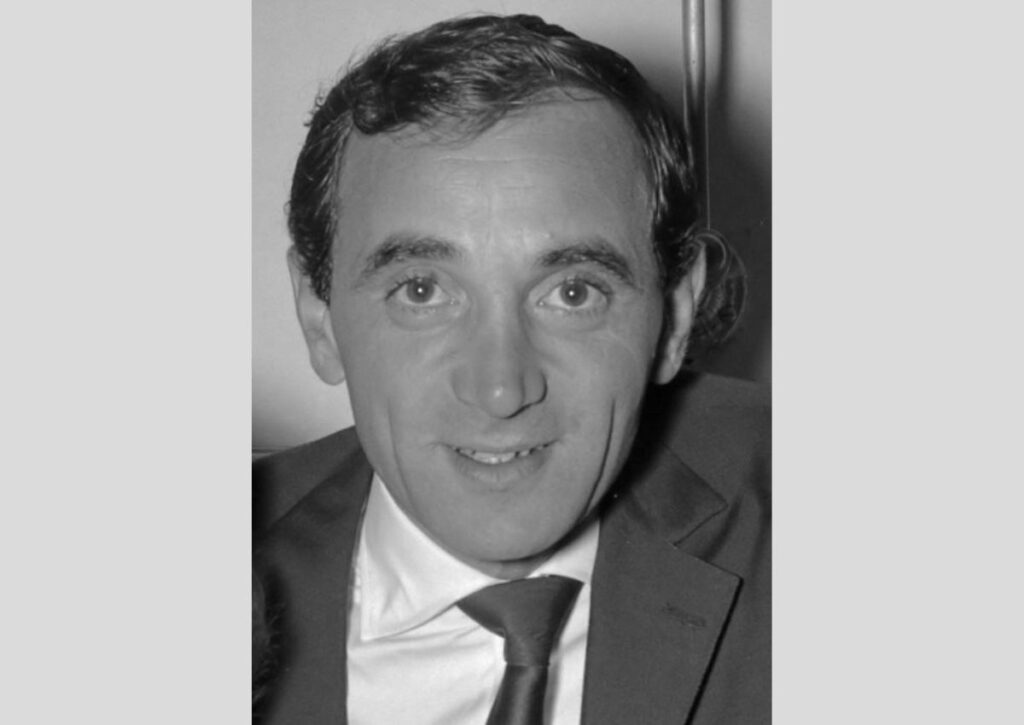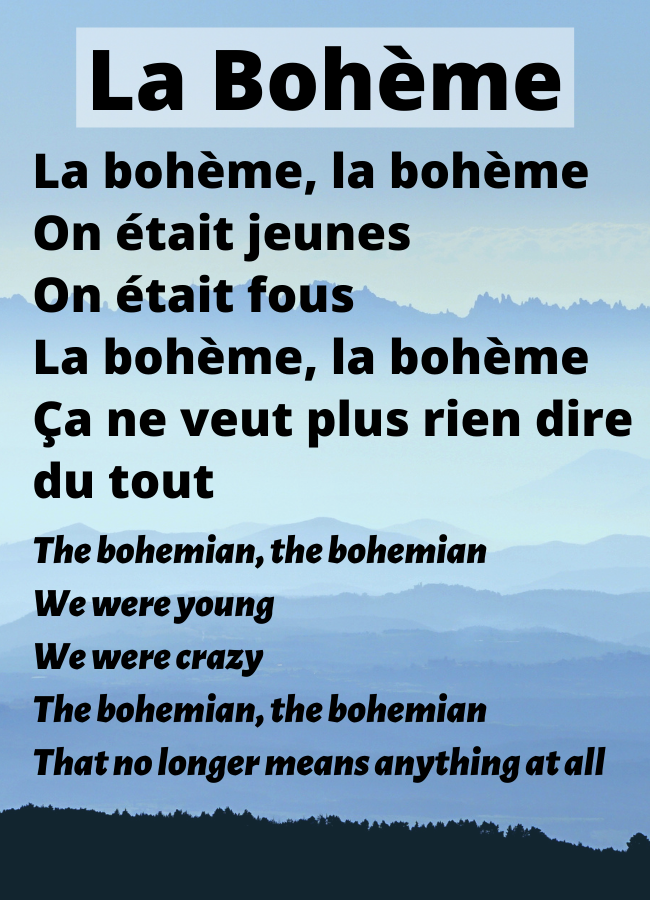“La Bohème” (pronounced lah boh-ehm or la bɔɛm) is the most famous song of French-Armenian singer Charles Aznavour. Recorded in 1965, the song was written by both Aznavour and French lyricist Jacques Plante. The meaning of “La Bohème” is “The Bohemian”. La Bohème is of the Chanson genre, which means it is a French lyrics-driven song. The main theme of the song is about longing for the happier days of youth despite poverty.

La Bohème song overview
The lyrics of the song La Bohème are about a painter reminiscing about the olden days in Montmartre. Montmartre is known for being the artists’ quarter of Paris.
Many famous painters spent time there during the Belle Époque (1872 to 1914) including Claude Monet, Pierre-Auguste Renoir, Pablo Picasso and Vincent van Gogh. The neighborhood was known for its openness and and bohemian atmosphere. This page on our site covers French painters.
Listen to La Bohème
Below you can listen to La Bohème by Charles Aznavour on YouTube and follow along with the French and English lyrics below.
You can also use the following to listen to the song on Spotify.
La bohème lyrics analysis
In the lyrics to La Bohème, Aznzvour sings in the role of an artist. The artist is a former resident of the Monmartre artists’ neighborhood who sings about the bohemian days when he was young and hungry, but happy.
The following analysis the lyrics line-by-line highlighting notable grammar and vocabulary.
Je vous parle d’un temps
This line translates to “I speak to you about a time”. The entire song is about the recounting of a time when life is Monartre was carefree and happy.
Accrochait des lilas jusque, Jusque sous nos fenêtres
These two lines translate to “Hanging lilacs, just under our windows”. The verb accrocher means to hang up. By using lilacs, these two lines the lyrics paint an image of liveliness and color in the particular setting of this artists’ quarter.
Et si l’humble garni, Qui nous servait de nid
These two lines translate to “And if the humble furnished rooms, That we used as (love) nests“. The word garni is an old-French word for furnished room. The word nid means nest. A figurative meaning of nid is “love nest” or “un nid d’amour”.
Ne payait pas de mine
We translated this line to “appeared to be modest”. The expression ne pas payer de mine means to “not look good” or “to not look much”.
C’est là qu’on s’est connu
This line translates to “It is there where we met each other”. Se connaitre (to meet each other) is an example of a reciprocal reflexive verb. French uses reciprocal reflexives to indicate “each other”.
Moi qui criait famine
This line translate to “Me who was crying famine”. The expression “crier famine” translates literally to “to cry famine” and means to starve.
La bohème, la bohème
Each time the chorus is sung, it starts with “La bohème, la bohème”, which translate to to “the Bohemian, the Bohemian”. Bohème is both a noun and adjective in French.
Ça voulait dire
This line translated to “that meant”. The expression “vouloir dire“ means “to mean”. Hence, “Que veut dire + word?” means “What does blank word mean?”
On est heureux
This line translate to “we are happy”. The lyrist could have written, “On était heureux” because he’s singing about the past. This is the imperfect tense to indicate “used to”.
The French personal pronoun “on” translates literally to “one” but is used to indicate “we” or “nous”.
Nous ne mangions qu’un jour sur deux
This line translates to “we only at every other day”. “Un jour sur deux” translates literally to “one day on two”. Sur means on. The French use the word “sur” to indicate “out of” for fractions. Hence, “un sur cinq”, for example” means “one out of five”.
Dans les cafés voisins
This line means “in the neighboring cafes”. The cafes in Monmartre were known as lively artist hangouts. Hence, this is why they are being mentioned in the song.
Nous étions quelques-uns
We translated this line to “there were a few of us”. The translation of quelques-uns is few, or a few. “Étions” is the verb être (to be) conjugated in the imperfect tense.
Qui attendions la gloire
We translated this line to “Who waited for glory“. The verb attendre can translated to both “to wait” and “to expect”. The word qui is a relative pronoun that means “who”.
Et bien que miséreux, Avec le ventre creux
These two lines translate to “And although poor, With an empty stomach”. Bien que is a conjunction which translates to both “though” and “although”. The adjective creux translates to both “hollow” and “empty”.
Nous ne cessions d’y croire
This line translate literally to “We did not stop believing in it”. Here, the y is an indirect object pronoun meaning “it” for inanimate objects. In analyzing the lyrics, the “y” or “it” most likely refers to “la gloire” or glory from a few lines above.
Et quand quelque bistro, Contre un bon repas chaud
These two lines translate to “And when some bistro, In exchange for a hot meal”. Normally, contre translates to against. However, the translation which applies in this context is “in exchange for”.
En oubliant l’hiver
While we translated this line to “forgetting winter”, the literal translation is “while forgetting winter”. This is an example of the French gerund, which combines the preposition “en” with the present participle, to express “while + verb’ing”.
Souvent il m’arrivait
We translated this line to “It often happened to me”. The verb arriver translate to both “to arrive” and “to happen” or “to occur”. The word “il” here doesn’t mean “he”, as in the subject pronoun, but “it”.
De passer des nuits blanches
This line translates to “To spend entire nights awake”. The French expression “passer une nuit blanche” (literally to spend a white night) means “to have a sleepless night” or “get no sleep”.
Et ce n’est qu’au matin
This line translates to “And it’s only in the morning”. This is an example of a ne…que negation, which means “only”.
Fallait-il que l’on s’aime
We translated this line to “We must have loved each other”. This line uses the verb “falloir” (to be necessary, have to) in the imperfect tense.
Et nous vivions de l’air du temps
It was difficult to come up with a good translation for this line. Our translation was “And we experience the spirit of the times“. The French verb vivre means both “to live” and “to experience”. “L’air du temps” translates to “the spirt of the times” refers to the atmosphere or feeling of the bohemian time period.
Quand au hasard des jours
This line translates to “When on some random day“. The translation of au hasard is “at random”. In these lines, the singer is talking about being older and going back to visit his former residence in Monmartre and not recognizing it.
Je m’en vais faire un tour
We simply translated this line to “I go visit“. The verb s’en aller means both “to go” and “to leave”. It is a reflexive for of the verb aller (to go). The expression “faire un tour” means both “to have a stroll” and “go for a walk”.
À mon ancienne adresse
This line translates to “My former address“. The “À mon” part of the line means “at my”. When the adjective ancien (ancienne in this case because it’s feminine) precedes a noun, it means “former”. When it follows a noun, it means “old”.
Je ne reconnais plus
We translated this line to “I will no longer recognize” because the singing is singing about a future event. The negation rule ne + verb + plus is used to express “anymore”.
Ni les murs, ni les rues
This line translates to “Neither the walls, nor the streets“. Another negation rule, ni…ni means neither…nor.
Qui ont vu ma jeunesse
This line translates to “that saw my youth”. Another translation could have been “that witnessed my youth”.
En haut d’un escalier, Je cherche l’atelier
These two lines translate to “At the top of the stairs, I look for the workshop”. In these lines, the singer is revisiting the exact places in Montmartre where he spent his youth painting.
Dont plus rien ne subsiste
This line translates to “In which nothing remains”. Dont has several translation and usages including “in which”. In the context of this line, the verb subsister means “to remain”.
Dans son nouveau décor
This line translates literally to “in its new decor”. However, we translated it to “in its new scenery”. This is because the singer is describing visiting Montmartre after many years and not recognizing its scenery.
Montmartre semble triste, Et les lilas sont morts
The lyrics of La Boheme end on a sad not as the singer goes back to visit his old neighborhood where he lived as a happy painter in his youth and sings, “Montmartre seems said, And the lilacs are dead”.
La Bohème, La Bohème, Ça ne veut plus rien dire du tout
On the very last line of the song, Aznavour sings, “The bohemian, the bohemian, That no longer means anything at all”. Essentially, what he’s conveying is that the happy and carefree days of being a youthful painter in Montmartre are finished and completely a thing of the past.

La Bohème lyrics (French and English Translation)
Translated by: David Issokson
Je vous parle d’un temps
Que les moins de vingt ans
Ne peuvent pas connaître
Montmartre en ce temps-là
I talk to you about a time
That people under 20 years-old
Cannot know
Monmartre during that time
Accrochait ses lilas
Jusque sous nos fenêtres
Et si l’humble garni
Qui nous servait de nid
Ne payait pas de mine
C’est là qu’on s’est connu
Moi qui criait famine
Et toi qui posais nue
Hanging lilacs
Just under our windows
And if the humble furnished rooms
That we used as (love) nests
Appeared to be modest
It is there where we met each other
Me who was crying famine
And you who posted in the nude
La bohème, la bohème
Ça voulait dire
On est heureux
La bohème, la bohème
Nous ne mangions qu’un jour sur deux
The bohemian, the bohemian
That meant
We were happy
The bohemian, the bohemina
We only at every other day
Dans les cafés voisins
Nous étions quelques-uns
Qui attendions la gloire
Et bien que miséreux
Avec le ventre creux
Nous ne cessions d’y croire
Et quand quelque bistro
Contre un bon repas chaud
Nous prenait une toile
Nous récitions des vers
Groupés autour du poêle
En oubliant l’hiver
In the neighboring cafés
There were a few of us
Who waited for glory
And although poor
With an empty stomach
We did not stop believing in it
And when some bistro
In exchange for a hot meal
Accepted one of our paintings
We recited versus
Grouped around the stove
Forgetting winter
La bohème, la bohème
Ça voulait dire
Tu es jolie
La bohème, la bohème
Et nous avions tous du génie
The bohemian, the bohemian
That meant
You are pretty
The bohemian, the bohemian
We also had some genius
Souvent il m’arrivait
Devant mon chevalet
De passer des nuits blanches
Retouchant le dessin
De la ligne d’un sein
du galbe d’une hanche
Et ce n’est qu’au matin
Qu’on s’asseyait enfin
Devant un café-crème
Épuisés mais ravis
Fallait-il que l’on s’aime
Et qu’on aime la vie
It often happened to me
In front of my easel
To spend entire nights awake
Touching up my drawing
From the breast line
From the curves of the hip
And it’s only in the morning
That we (I) finally sat down
In front of a coffee with cream
Exhausted by delighted
We must have loved each other
And we loved life
La bohème, la bohème
Ça voulait dire
On a vingt ans
La bohème, la bohème
Et nous vivions de l’air du temps
The bohemian, the bohemian
That meant
We were twenty years-old
The bohemian, the bohemian
And we experience the spirit of the times
Quand au hasard des jours
Je m’en vais faire un tour
À mon ancienne adresse
Je ne reconnais plus
Ni les murs, ni les rues
Qui ont vu ma jeunesse
En haut d’un escalier
Je cherche l’atelier
Dont plus rien ne subsiste
Dans son nouveau décor
Montmartre semble triste
Et les lilas sont morts
When on some random day
I go visit
My former address
I will no longer recognize
Neither the walls, nor the streets
That saw my youth
At the top of the staircase
I look for the workshop
In which nothing remains
It its new scenery
Monmartre seems sad
And the lilacs are dead
La bohème, la bohème
On était jeunes
On était fous
La bohème, la bohème
Ça ne veut plus rien dire du tout
The bohemian, the bohemian
We were young
We were crazy
The bohemian, the bohemian
That no longer means anything at all
More French song lyrics posts by David Issokson
Lyrics of more French songs:
- La Vie en Rose (Edith Piaf)
- Non, Je Ne Regrette Rien (Edith Piaf)
- C’est Si Bon (Yves Montand)
- La Mer (Charles Trenet)
- Ne Me Quitte Pas (Jacques Brel)
- Les Champs-Elysées (Joe Dessin)
- Les Feuilles Mortes (Yves Montand)

